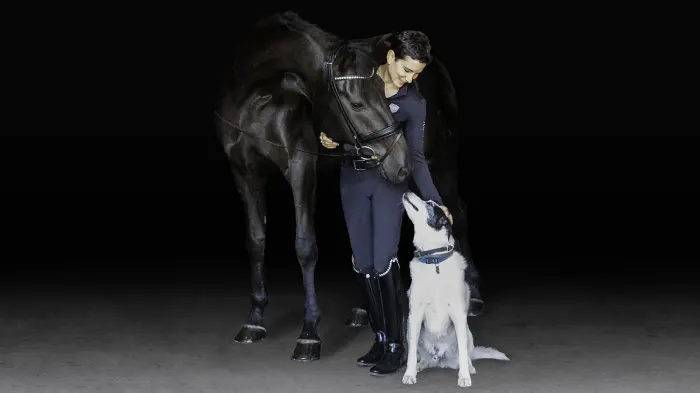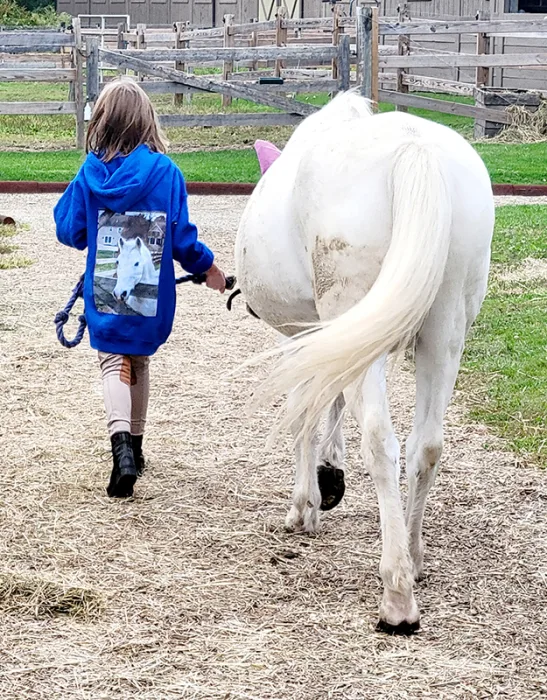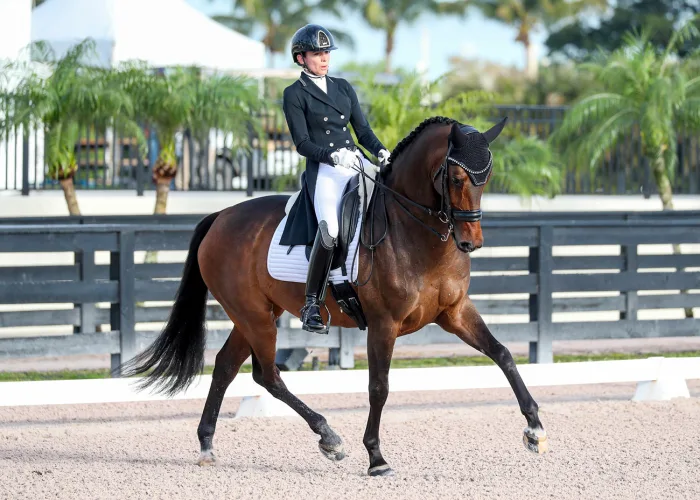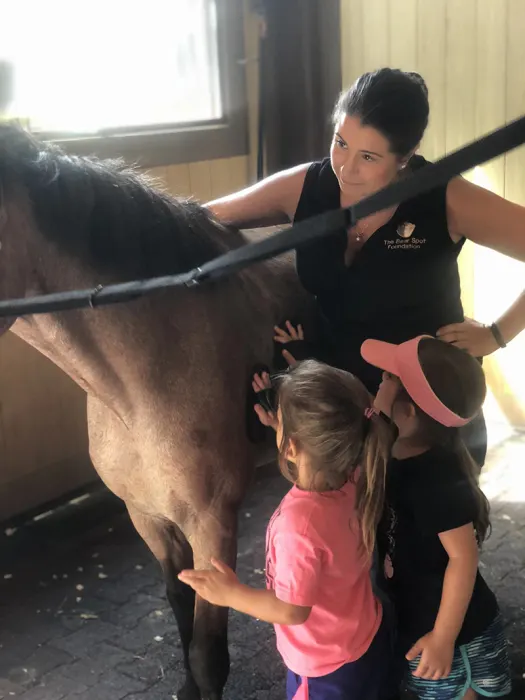Jane Karol stands at one end of the large indoor arena, watching a powerful bay skip across the diagonal, the rider stretching tall as she shifts her weight for the tempi changes. At the other end of the ring, a little girl wearing hot pink yoga pants belts out the lyrics to “Let It Go” before leaping from the mounting block, while Willy Wonka, a mohawk-sporting therapy pony, looks on. At Karol’s Bear Spot Farm, this juxtaposition of high-performance riding and horse as co-counselor in a psychotherapy session is just another day at the barn.
The therapeutic benefits of riding have been documented as far back as ancient Greece, but the concept of equine-assisted therapy gained traction in modern times after Danish dressage rider Lis Hartel, who had been partially paralyzed due to polio, won an individual silver medal at the 1952 Olympic Games. Since then, therapeutic programs have increasingly used horses to assist clients in improving physical skills, functional abilities and even language development. However, when Karol began working on her dissertation for her doctorate in psychology in the 1990s, few therapists were using horses to help address mental health issues like anxiety, depression and traumatic stress.
At the time, Karol was also building her dressage training business at Bear Spot in Acton, Massachusetts.

“I wanted to have some way of connecting with people in a therapeutic way for mental health related issues; physical disabilities were not my forte or my focus,” says Karol. “I thought, ‘How about an experiential modality using the horses as our co-therapists?’ Instead of having [talk therapy] be in an office, let’s have this be more experiential. Let’s get the body involved as well as the mind. Let’s use whatever this is about horses that is healing, and let’s see if we can put it into a system that works, a method that works in therapy.”
Karol combined what she’d learned about other animal-assisted therapies with her knowledge of experiential therapies like art, dance and music, as well as programs like Outward Bound, and she created a proposal to try psychotherapy with horses. She founded the Bear Spot Foundation for Equine-Facilitated Psychotherapy in 2004 to treat individuals, mostly children and adolescents, with psychiatric conditions.
“I did a pilot study and took it from there,” says Karol. “There was nothing like this program out there.”
HORSE AS CO-COUNSELOR
For most equestrians, the barn is often a place of solace and peace, and a good cry into the mane of a beloved mount can provide a cathartic release. Karol extends these anecdotal benefits of comfort and connection further with her therapeutic work.
“We’re working on a body level, on a regular talk-therapy cognitive level, and on a metaphorical level,” she says. “We try to get all the levels, but obviously not all at once.”
The most significant factor in predicting the effectiveness of psychotherapy is the rapport a client develops with their therapist. Horses help bridge that gap, particularly for children or adolescents who may be reluctant to talk.
“It’s very hard to take someone, a child especially, who is not stable and dig in or challenge the conflicts they’re struggling with until you: 1) develop rapport, and 2) develop a safe place,” says Karol. “When you get a kid who loves animals, they want to come to therapy. They’re coming to see the horses; they’re coming to throw their arms around the horses, touch the horses, and get this bodily primal experience of contact comfort and a sense of safety with the horse and the therapist who is with them.
“When you have a therapeutic beginning like that, you have a foundation to do more difficult work with these kids, adolescents and some adults, of looking at self and what’s making their lives so painful,” she continues.
Karol says many clients don’t have words to express what they’re going through at first.
“In order to talk about how they feel, they need language, and if they don’t have a way to feel safe enough, or the place doesn’t offer a way to learn how to talk about what they’re feeling or even learn what they’re feeling in their bodies and their emotions and then put words to it, they don’t end up staying in therapy,” she says.
Horses help people find those words.

“The horse will spook at something—our therapy horses are pretty good, but you know, they’re horses—if they look or spook at something, you can ask the kid, ‘What is the horse afraid of?’ ” Karol explains. “ ‘What is the horse feeling right now? How do you know? How would you describe that?’ Then they’re not describing themselves directly; they’re describing how they imagine the horse feels, which is of course usually about them because most of them don’t know about horses.”
While dogs are the most common therapy animal, researchers have published results with other farm animals and even with dolphins.
“Dogs are different; they bring up different feelings than horses for a few reasons, but it helps,” Karol says. “We have all kinds of rescue dogs; they look all different, and they are different sizes. They also are helpful with kids making attachments to the animals and then using those relationships to learn about themselves.”
However, Karol maintains there’s something special about horses.
“You have this beautiful horse or pony in front of them that pulls them,” she says. “This is a thing I don’t have language for and never have, [but] it’s a big animal that has this presence, almost a magnetic presence, and the eyes are these round, beautiful, watery eyes. There’s been some research on shapes of eyes and how people of different ages respond. The shape of the eyes of the horse, something about them pulls these kids to them.”
‘COMPLETELY OBSESSED WITH THEM’
Karol knows firsthand the magnetic pull of horses.
“Once I even heard what a horse was, I was completely obsessed with them,” she says. “I have no idea where it came from. I did not grow up in a horsey family.”
She remembers having 100 model horses lined up in her childhood bedroom in Massachusetts, but her first experience with the real thing was at summer camp around age 11. While Karol lobbied for lessons, it wasn’t until her family moved to Texas when she was 15 that she gained access to regular saddle time.
ADVERTISEMENT
“It was a big move, and my parents said they would get me a car or a horse to help with the move,” says Karol. “I said, ‘A horse, please.’ ”
“When you get a kid who loves animals, they want to come to therapy.”
JANE KAROL
Karol ended up with a green 3-year-old Saddlebred. “Literally, every time I put my leg around the horse, the horse took off,” she recalls. “I learned the hard way and survived somehow. It was just me; my parents didn’t know anything about horses. I did borrow the car to get to the horse. There was one woman—she was about 19 or 20—who would help me every once in a while, and she was a good rider. She helped me start to learn something.”
Karol wasn’t put off by her struggles. “I see this a lot in my clients, especially my adult amateur clients—the falling off, and the danger of it never outweighed the desire,” she says.
Karol sold her horse before attending Washington University in St. Louis, where she majored in history. “They had a great intellectual history department,” she says. “It was psychologically oriented, but the psychology department wasn’t as interesting to me as the philosophy, literature, art and science that you study in intellectual history. We were reading [Franz] Kafka and modern art. I focused more on the modern intellectual history, existentialism, all these things that touch on the human condition in a way that some of those psychology classes don’t.”
After graduating, Karol returned to Massachusetts to apprentice in the family business. Her brothers, Steve, Tom and Bill Karol, focused on the financial side of HMK Enterprises, a private equity company started by their father, Herb Karol, while Jane helped with the Herbert M. Karol Foundation, which supports brain tumor and cancer research. But Jane never stopped yearning for horses, so she sought out lessons. Before long she was back in school, pursuing a master’s degree in organizational development at American University in Washington, District of Columbia, on the weekends. She also started riding with eventing trainer Lainey Johnson.
“I learned how to jump. I wasn’t horrible, but I wasn’t good,” Jane recalls. “I remember riding and learning and making mistakes and riding the most untalented and unathletic school horses, but riding a lot and having her guide me in the basics of jumping, the event world and dressage.”
Jane bought Poetry’s Captain, a Canadian-bred 5-year-old, as a potential event horse. “They said he was a Westphalian, but I’m pretty sure he was a draft mixture,” says Jane with a laugh. “His head and neck were put on upright, so he wasn’t a bad dressage horse.”
As Jane developed “Captain,” she realized eventing wasn’t for her. “I have a personality where I wanted to keep raising the fences,” she says. “I wanted to keep going. I was honest with myself that it wasn’t the safest thing [for me] to do.”
With the help of Dutch trainer Gerrit-Claes Bierenbroodspot, Jane pursued dressage, eventually training Captain to Grand Prix.
“He had the biggest heart,” says Jane. “If I knew what I know now, there would’ve been a lot less holes in the work. He became almost a machine on the changes. The piaffe could have been a lot better, but I barely knew what I was doing. This horse had so much willingness to learn that together we learned to do all the pieces.”
Jane appreciates the emphasis in dressage on the connection and relationship with the horse. “This feeling where you’ve worked with the horse for so long that when you are just thinking about something, and the horse hears you and knows what you want,” she says. “That moment, even if you’re just turning left, and you feel like you didn’t do anything with your body, but the horse turns because you’re thinking about it, and you’re so attuned to each other, that is what drives me in this sport.”
IN THE SAME ARENA
Jane, 60, and her daughter, Hope Cooper, 26, now run a thriving competition business out of Bear Spot Farm with more than 20 horses in training. Jane has trained 12 horses to Grand Prix and has won at the CDI Grand Prix level. She’s currently bringing along Vioretta, an 8-year-old Oldenburg mare (Vivaldi—Loreana, Don Schufro) she competed in the U.S. Equestrian Federation Dressage Festival of Champions (Illinois) last year. Jane debuted Vioretta at Prix St. Georges in February along with Don Pedro, an 11-year-old Oldenburg gelding (Daily Deal—Brittania) owned by Jennifer Silver.

“I love the training process,” says Jane. “At the same time, we have this other piece: the therapy program. Anyone who comes to my barn and wants to learn the top sport, we say, ‘We just want you to know that there’s a very important piece; it’s a therapy program; we’re seeing kids through the day.’ It doesn’t get in the way of the high-performance work, but it is often in the same arena.”
This dual focus creates an educational atmosphere that appeals to training clients and therapy clients alike.
“Everybody brings their own baggage into the sport, whether it’s your stage fright, anxiety around showing, a feeling of low self-confidence with regards to your ability, or a discrepancy between what your trainer is able to have your horse achieve as opposed to what you yourself are able to get out of your horse,” says Lindsey Plante, 40, a psychotherapist and equestrian who has been involved with Bear Spot since she was 14.
“You can take the therapist out of the office, but you can’t take the therapist out of the therapist,” Plante adds with a laugh. “[Jane] brings her clinical understanding, her understanding of how an athlete functions emotionally and psychologically, and her ability to connect with all types of horses. Her ability to connect and communicate and to break things down in a way that really resonates with each individual, whether it’s the language she uses and the techniques, the training tools she uses, or just the way she approaches training and developing young horses, it’s so balanced.”
Plante says the way Jane emphasizes connection and development of trust with the horse leads to a sustainable and genuine relationship. “Those relationships are what allow for the growth and change and development and moving up through the levels,” says Plante, “the developing of the sophistication and the nuance that’s necessary to hone in on the sport and really develop your skills.”
Cooper, who won her first open CDI Grand Prix in 2022 aboard Mary Mansfield’s Hot Chocolate W (Hochadel—Pikolina, Pik Senior), agrees that her mother’s focus on developing a relationship with a horse also translates into other facets of life.
“There’s so much we can learn about ourselves and our relationships with the horses and how they relate to our relationships with the humans in our lives,” says Cooper.
“[Jane is] a very down-to-earth, ‘figure it out yourself, but I’m here if you need me’ kind of person,” says Cooper. “It’s sort of brought a self-reflective quality to both family life and my life in general. It’s made me a much better rider too. Without that self-reflection you can get lost in top sport and lost in trying to make this goal happen. You lose all these things around you, even your relationship with the horse.”
While Cooper says Jane enjoys competing, it’s not her top priority. “The thing she finds most meaningful in life from a philosophical standpoint and also in her life itself is attachment, being attached to relationships and to friendships and to family and your relationships with horses, those things that pull you and are grounding outside of yourself,” says Cooper. “The other most important thing to her in life is just being curious about the world around you. She’s an unbelievable listener. She doesn’t just listen. I don’t know where she gets the perspective she brings to conversations, but it’s unmatched. I’ve never met anyone else who can get you to think outside the bubble you’re existing in other than her.”
While Cooper is pursuing a professional equestrian career, she danced seriously before attending Connecticut College, where she triple majored in behavioral neuroscience, modern dance and Africana studies. “My dad [Howard Cooper] is a First Amendment scholar and a trial and criminal defense lawyer,” says Hope. “My mom and my dad are both really curious about the world around them, always asking questions, always reading.”
ADVERTISEMENT
Hope’s sibling, Scoop Cooper, 21, is an artist who is attending Bard College (New York). “All families come with difficult moments, but the thing we all have in common is a curiosity about each other and the world,” says Hope.
Jane continually seeks out ways to improve her own riding and training. In addition to Bierenbroodspot, she’s worked with Spanish Olympian Juan Matute Sr., and German team rider Christoph Koschel is her coach now.
“There’s a really good lineage of people who have helped my mom build her knowledge,” says Hope. “I did go over and train in Germany with Isabell Werth for a month and Christoph for two months. It’s helpful in life to have mentors who are outside of family and parents, but it’s helpful to have my mom and Christoph. I don’t think I could do what I’m doing without either of them.”
“Going abroad really showed me how similar my mom’s understanding of training and dressage is to these top people that I went to train with in Europe,” Hope adds. “She’s gone to lots of other barns and built her barn around what does and doesn’t work.”
A CULTURE OF COMPASSION
For the Bear Spot clients, the atmosphere the therapy program creates is part of the appeal.
“Most sport horse barns, it’s much more about your scores on the dressage test, or who wins, or where you lie in terms of the hierarchy of importance and notoriety in the industry or discipline of the barn,” says Plante. “At Bear Spot, it feels like you’re arriving at this place where you can be yourself and where the best parts of yourself will be drawn out. It’s also simultaneously a place where clinical work is done and where people are healing and growing and transforming within a therapeutic relationship, and on top of that it’s this world-class training facility for all levels. It’s the real deal in so many ways.”
Riders tend to be flexible and compassionate around the therapy program, and the interaction benefits both the dressage clients and the therapy clients.
“I’ll have boarders in formal lessons with Jane who will adjust a half-pass because my kiddo and I stopped at X to look at the sparrow who’s up in the rafters of the barn,” says Plante. “They will half-pass around me. Later when I apologize, they’ll say, ‘We’ve got an eye out for you. We know. You do you.’
“They’re on board, which I think speaks to that culture,” continues Plante. “They have to tack up their horse in their stall because I’m giving a bubble bath to a pony with a 9-year-old. If the culture aligns with your own values and what’s important to you, it’s a fit, and it’s home. If you have a different approach to the sport, and if you have different priorities, there are different barns out there that would be a better fit.”
“[Equine-facilitated psychotherapy] doesn’t get in the way of the high-performance work, but it is often in the same arena.”
JANE KAROL
Professional horse show photographer Zoe Murphy first met with Jane when she was 10 and going through a rough patch at school. She stayed in therapy with Jane for three years before a change in schools meant she had to move on, but the experience of being in a high-performance atmosphere had a profound influence on her.
“Being at Jane’s made me aspire to be bigger and better and work with these types of people,” says Murphy. “Her clientele are also the nicest people ever. She surrounds herself with people of a higher caliber.
“It’s unlike therapy that you’re ever going to find anywhere else,” Murphy adds. “I’ve looked as an adult for other types of equine-assisted psychotherapy, and you’re never going to find something like what Jane offers. Not just on the level of what Jane has, but the quality of her facility and therapy. At the [Bear Spot] Foundation shows, they’re doing rides up to Grand Prix. You see riders spending the money and the time, sending their horses out to training or going to Florida. This is really top-level training. As a therapeutic client, you’re mingling with these people and getting almost this luxury experience without having to pay the cost of competing at that level.”
A MEANINGFUL LIFE
The Bear Spot Foundation receives some donations, and Jane holds an annual horse show fundraiser to help cover the expenses of the three horses, two ponies and a mini involved in the program, but she laments that she hasn’t figured out a better way to make equine-facilitated psychotherapy available to more people.
“I started the foundation so we could bring in donations and grants,” she says. “The people who do not have the funds to cover would be able to get some help from the foundation. That didn’t work out exactly the way that I wanted. The foundation helps me pay for the horses’ shoeing and taking care of them, but it hasn’t helped too many times. I’ve come up against some walls. I’m not a grant writer. Getting donations and grants is much more difficult than I expected.

“I’m the worst person asking for money,” she adds. “I don’t feel comfortable. I just don’t push it. I did set up the foundation hoping that there would be more support from the horse world, and people who were in the therapy world, and people who could see that this was a powerful methodology.”
Jane’s still serious about her own high-performance career for now, but she can see a future where Hope takes over that side of the business, and she develops the therapy program further. Jane hired Plante full time in 2021 and regularly takes on therapy interns. She’s also in the process of writing a book, and she still conducts research and publishes academic papers.
When asked why she never focused solely on competitive achievement, Jane replies, “It doesn’t feel like a meaningful life to focus on myself. It’s not that I don’t—I’m obviously doing that in a lot of ways—but doing that directly where everything is focused on me is a little uncomfortable.
“There’s a certain sense of meaning when you’re reaching out to people and connecting with people and horses and animals and feeling like you’re adding value to the world,” she continues. “That’s also a very narcissistic thing to say because I’m not sure I really am. But I’m trying to do something like that; that seems like a narrative that makes sense in terms of what makes life meaningful. You examine your life; you help people examine their own and see if you can help with some of this very impossible human existential struggle, try to connect with people around that.”
This article appeared in the May 22-June 5, 2023, issue of The Chronicle of the Horse. You can subscribe and get online access to a digital version and then enjoy a year of The Chronicle of the Horse and our lifestyle publication, Untacked. If you’re just following COTH online, you’re missing so much great unique content. Each print issue of the Chronicle is full of in-depth competition news, fascinating features, probing looks at issues within the sports of hunter/jumper, eventing and dressage, and stunning photography.














